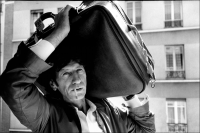Publications / Tr@nsit Online
Equally Criminal? Totalitarian Experience and European Memory
Instead of dwelling upon the catastrophes of the twentieth century, many Europeans ask if we should not thoughtfully “forget” them. However, the endurance of historical memory in the united Europe is demonstrated by contemporary political differences between European member states, which can be dealt with only if a European memory is developed. The difficulty here lies in paying due respect to the memory of the crimes both of National Socialism and of Soviet totalitarianism while avoiding a hierarchy of competing victim groups.
Workers in and after the “Worker’s State”
Mladen Lazic asks: how have the processes of systemic transformation in Serbia and Croatia affected the lives and livelihoods of workers? Has the postcommunist abandonment of the "worker's state" led to social change? And how has this change affected the speed of systemic transformation.
Was bleibt von 1989?
Eine Debatte zwischen Václav Havel, Viktor Klima, Adam Michnik und Viktor Orban. Moderation Timothy Garton Ash
In Searching for the Hidden History of 1989
Much of the history of the 1989 revolutions has been lost or remained hidden until now. A good part of it, however, can be retrieved by reconstructing the expectations (both elite and popular) prevailing at the time. A welcome message to our conference: The Brave New World after Communism. 1989: Expectations in Comparison.
Die DDR im Rücken. Die sozialisatorische Mitgift der Ostdeutschen und der aktuelle Konflikt von Erinnerungen und Leit-Erzählungen im vereinigten Deutschland
Die erste umschreibt, dass man Menschen oder Verhältnissen „den Rücken kehrt“, sich von ihnen distanziert oder sie hinter sich lässt. Das ist eine Bewegung, die ein großer Teil der DDR-Bevölkerung vorgenommen hatte: zuletzt in den Jahren 1988/1989, als viele Zehntausende flüchteten und dann zur Volkskammerwahl am 18. März 1990, als eine deutliche Mehrheit der Noch-DDR-Bürger ein Parteienbündnis wählte, das für ein sofortiges Aufgehen der DDR in der Bundesrepublik eintrat.
From Borderlands to Bloodlands
With Russia’s annexation of Crimea and the military conflict in eastern Ukraine, the era of post-Soviet tolerance of blurred identities and multiple loyalties has ended. Borderlands have once again turned into bloodlands.
The Orthodox Component in the Russian Support for Eastern Ukrainian Separatists
Due to the recent tragic events in Ukraine and the ongoing military conflict in the East of the country, Orthodox Christianity has become increasingly important to Western observers and journalists in their attempts to explain the Russian support for the Eastern Ukrainian separatists. Two explanations appear prevalent in Western media, and I believe that there is a transatlantic divide as to the relative persuasiveness of these explanations. One is the democratic explanation, which appears more frequently in US media. This explanation holds that Putin cannot tolerate a pro-Western, democratic Ukraine because the success of this model would endanger his own autocratic regime. Therefore he does everything he can to sabotage the democratic developments in Ukraine. The other explanation, which prevails in European, and in particular in German media, argues that we are confronted with a new dimension of Russian nationalist aggression, an aggression that is fed by ideas of Russian superiority and rooted in Russian Orthodoxy.

Birth Certificate: The Story of Danilo Kiš. A review
Birth Certificate is a book about one writer’s obsession with another writer. The author, Mark Thompson, is a British historian of Yugoslavia. Danilo Kiš was a Yugoslav novelist, as well as the translator of Anna Akhmatova from Russian, Endre Ady from Hungarian, and Raymond Queneau from French. He was a Hungarian Jew, a Montenegrin, and an Orthodox Christian—an “ethnographic rarity” that he believed would die out with him.
In Ukraine, the Future of the Russian Orthodox Church is at Stake
When President Vladimir Putin announced the annexation of Crimea as a part of Russia on Tuesday, 18th March, 2014 in a pompous speech televised directly from the Kremlin, Patriarch Kirill was missing from the audience. He had sent a substitute. His absence was noticed by all observers, and it was interpreted as a sign that the Moscow Patriarchate was taking a distance from the politics of the government. It is hard to judge, from today’s perspective, what strategy the Patriarch of Moscow will pursue with regard to Putin’s politics towards Ukraine and whether his absence from the presidential speech was a sign of friction or of silent consent. But what can be said for sure is that in Ukraine, the Russian Orthodox Church’s approach to pluralism is at stake.
Free and Unfair: The Hungarian Elections
Hungary’s parliamentary elections in April saw a 61% turnout, the lowest since 1998. The high abstention rate was a sign of disaffection with Hungarian politics: four-tenths of the electorate believed it was left without a genuine political choice.
Dressed-up Nationalism
Present-day Polish nationalist discourse intersects with and is sustained by the “elite” discourse: it is dressed up in elegant and stylish clothes, it is propagated with eloquence and diligence, and it is supported with scholarly evidence and academic titles. It draws on the noble past and uses as a weapon unresolved historical traumas and past grandeur. It finds its propagators among politicians one would not define as extremist but as moderate; as liberal rather than populist; and as a voice of “middle class” and urban intelligentsia.
The Languages of Ukraine and the War for Russian “Compatriots”
In the course of the recent dramatic events in Ukraine, great emphasis has been put on the language question. In this essay, I intend to clarify some crucial issues: I will demonstrate that Vladimir Putin’s allegations regarding the suppression of Russian speakers in Ukraine are part of a complex network of continuing propaganda, and I will confirm that Putin’s recent political moves are the result of an ideology that is dangerously close to that of Nazi Germany.